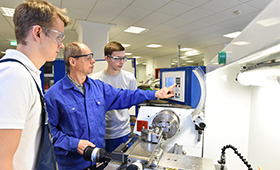Higher education dropouts welcome – but no special treatment is on offer
BIBB company survey on the dual vocational education and training of persons dropping out of higher education study
17/2016 | Bonn, 18.04.2016

The results of a survey of around 570 companies providing training conducted by the Federal Institute for Vocational Education and Training (BIBB) using the Reference Company System have revealed that companies are open towards providing training to young adults who have failed to complete degree level courses. In the light of demographic developments and the increasing difficulties in filling training places, companies are largely attracted by using the potential of higher education dropouts for dual VET. Despite this positive attitude, the vast majority of firms is firmly against the concept of special training regulations and models for such persons.
The notion that higher education dropouts should enjoy general exemption from vocational school teaching is rejected by over 80% of companies. The idea of setting up separate vocational school classes for these trainees also meets with a cool response from more than half of the companies surveyed. Notwithstanding this, around 30% describe such an approach as “good” or “very good”. It seems that some companies consider this to be a suitable instrument for increasing the attractiveness of dual vo-cational education and training for higher education dropouts.
By way of contrast, a further student survey conducted by BIBB in conjunction with the University of Maastricht makes it clear that the majority does not view separate vocational school teaching or the omission of such teaching as an issue of any relevance when making the switch from higher education to dual vocational education and training and that this factor does not contribute to raising the attractiveness of dual VET.
The companies offer a mixed response with regard to the question of further shortening the period of training for ex-higher education students beyond the limit which currently applies. Around half of the companies surveyed are against this, whereas about a third would welcome such a special regulation. The Vocational Training Act already permits young people in possession of a University of Applied Sciences entrance qualification or an upper secondary school leaving certificate to curtail their period of training by twelve months.
Further information on the results of the company survey is presented in the latest issue of the
BIBB-Report, 2/2016: “Higher education dropouts welcome as trainees at companies – but no special treatment should be provided if possible” at https://www.bibb.de/veroeffentlichungen/en/publication/show/id/7980.
More details of the results of the student survey carried out by BIBB together with the University of Maastricht are provided at www.bibb.de/de/37652.php (German only) and in BIBB press release No. 4/2016 at https://www.bibb.de/en/pressemitteilung_38716.php.
Reprint free of charge – voucher copy requested.